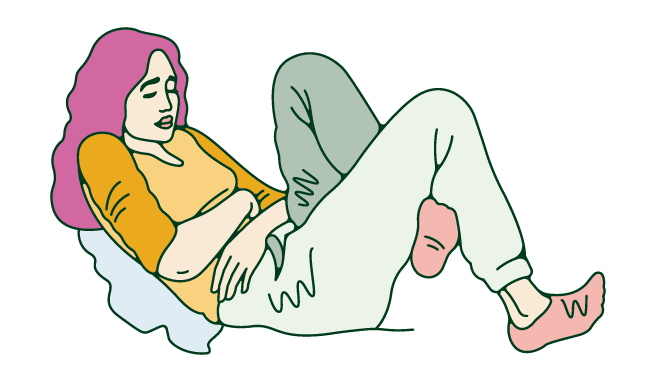Table of contents
1. Why are women so afraid of missing work due to period pain?
2. Does menstrual leave work?
3. How can you reduce period pain at work?
Illustrated by Sabrina Bezerra & Erin Rommel
We’ve all been there: You’re sitting at your desk, wanting to double over in pain, but instead you keep a smile on your face while you take yet another Midol. Menstrual pain is indeed pain, but we treat it like it’s more manageable than any other pain. Missing work due to your period is a no-go for many women, so much so that one study found that women who show up to work with period pain are losing out on nine days worth of productivity each year. That same study found that, on average, women are missing just one day of work per year because of period pain.

Why are women so afraid of missing work due to period pain?
Unfortunately, the answer is simple for anyone who menstruates. There remains a stigma about menstruation and that stigma extends to the person.. Women who are menstruating are more likely to be viewed as unstable and neurotic. Depictions of women in media who are on their periods are filled with shrieking, anger, and, often, a man cowering at her wrath. Even the very way we talk about menstruation (or try not to talk about it) comes down to stigma. It’s not a “feminine hygiene product.” Say it with us. It’s a tampon.
Women who take time off due to period pain fear being viewed as fragile by their coworkers and less valuable than a man by their employers. But some countries and companies have been trying to encourage women to take time off when they need it during their menstrual cycle.
“
Many women worry about taking time off because they fear doing so will cause the company problems, which could result in their own careers being halted by endangering their jobs or promotion prospects.
Does menstrual leave work?
Although for many of us, menstrual leave is a foreign concept, it actually already exists around the world, including in Japan, Taiwan, China, South Korea, Indonesia, Zambia, and Mexico. Japan’s national policy was introduced back in 1947, citing the belief that women should take the time off to care for their bodies to prepare for potential motherhood. For a policy that’s widely viewed as progressive, menstrual leave didn’t have a very progressive start. Throughout Japan and beyond, women’s need to bear children was cited as a reason why women must rest during that time of the month. Many women opted out of utilizing the time off due to a variety of factors, including harassment and discrimination in the workplace.
While the idea of menstrual leave alone can either be viewed as a brilliant boon to workers who menstruate or a logistical nightmare, depending on who you ask, the reality is, as with most things, there are many shades of gray to the policy. That’s why menstruation and menopause consultant Lara Owen, who worked with the Bristol, U.K., based company Coexist to develop their “period policy” shies away from outright calling it “menstrual leave.” Through her research, she has found that when companies simply enact a policy of, say, one paid day off per month of menstrual leave, women are far less likely to take advantage of it. Although neigh sayers of menstrual leave often claim that women will simply take whatever time off that they can get, leaving the company struggling, the reality is quite the opposite. Many women worry about taking time off because they fear doing so will cause the company problems, which could result in their own careers being halted by endangering their jobs or promotion prospects.
Owen found that a better way to enact a period policy is by considering it “menstrual accommodation in the workplace.” The difference between simple leave and accommodation is crucial here, as women are more likely to take time off due to period pain if they know that there are processes in place to keep their team going without them. Additionally, not everyone needs a full day off, but having the option of taking an hour to go rest if things do get painful can make women feel more supported at work. Another popular option is allowing women to work from home, where they can rest in their own abodes when they need to.
Both men and women alike have claimed that providing accommodation to menstruators would be detrimental to companies as a whole, but Owen found that all genders benefited from Coexist enacting measures to help those suffering from period pain. As periods began to be discussed more openly in the workplace, more men began to open up about their own well-being. The company developed “well-being rooms” for both menstruators and non-menstruators alike to be able to take time for their health during the workday.
“
Talking about a period policy at your work doesn’t have to mean enacting menstrual leave, but it may just set your company up for a change for the better for everyone’s well-being.
How can you reduce period pain at work?
You may not feel like you have the ability to miss work due to period pain. So, if you don’t feel comfortable taking time off during your period, there are a few things you can do besides over-relying on Midol.
For starters, you can talk to your company about enacting “well-being rooms” or something similar. Having a place where everyone can go when they’re struggling with mental or physical health would be good for the whole company.
Be sure not to skip lunch when you’re on your period, and opt for anti-inflammatory foods like nuts, seafood, and vegetables. And don’t forget to stay hydrated.
Although it might not always be in your control, you can try to plan your busy times around your cycle. Apps like the Flo Period & Ovulation Tracker can help you so that you know to keep your period days as free from stress-inducing projects and meetings as possible.
Studies show that it’s good for you, your coworkers, and your company for you to take care of your health during your period, even if you can’t take a full day off. But if you can take a day off, that’s also good for everyone too. Talking about a period policy at your work doesn’t have to mean enacting menstrual leave, but it may just set your company up for a change for the better for everyone’s well-being.






